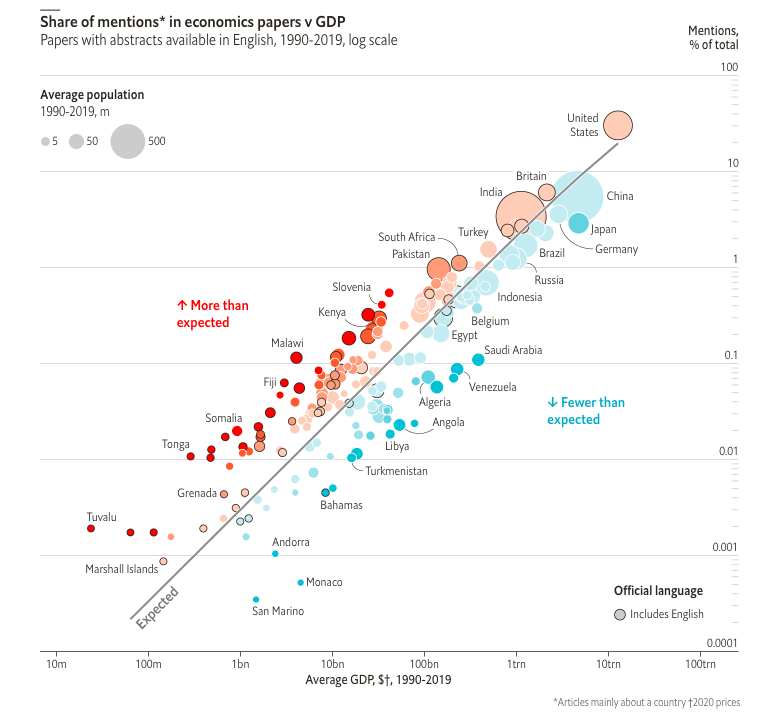Guest post by Jeff Mosenkis of Innovations for Poverty Action First a plug – my colleagues at IPA have done amazing work this year quickly pivoting a big research organization to tackle the covid crisis head-on, studying hunger, refugee issues, education and 80+ other topics, and staying up late into the night, over and over again. Not all of our expenses are covered directly by research grants, so we rely on donations for the rest. If you donate here BEFORE TUESDAY you gift will be matched, doubling the total. Thanks! A bizarre but massive fake news campaign seems to have involved reviving or impersonating a number of real/defunct NGOs in India, along with the fake persona of a dead Harvard Law professor, to spread anti-Pakistan, pro-India sentiment with the EU and UN, running for over
Topics:
Jeff Mosenkis (IPA) considers the following as important: Colombia, development, Economics, Education, entrepreneurship, India, links, news, Pakistan, Senegal, statistics, Venezuela
This could be interesting, too:
Lars Pålsson Syll writes Schuldenbremse bye bye
Lars Pålsson Syll writes What’s wrong with economics — a primer
Lars Pålsson Syll writes Krigskeynesianismens återkomst
Lars Pålsson Syll writes Finding Eigenvalues and Eigenvectors (student stuff)
Guest post by Jeff Mosenkis of Innovations for Poverty Action

- First a plug – my colleagues at IPA have done amazing work this year quickly pivoting a big research organization to tackle the covid crisis head-on, studying hunger, refugee issues, education and 80+ other topics, and staying up late into the night, over and over again. Not all of our expenses are covered directly by research grants, so we rely on donations for the rest. If you donate here BEFORE TUESDAY you gift will be matched, doubling the total. Thanks!
- A bizarre but massive fake news campaign seems to have involved reviving or impersonating a number of real/defunct NGOs in India, along with the fake persona of a dead Harvard Law professor, to spread anti-Pakistan, pro-India sentiment with the EU and UN, running for over 15 years.
- A fun tribute to Senegal, “How to Pretend You’re In Dakar Today“
- (Above) The Economist analyzed abstracts of 900,000 Econ articles to look at where geographically, economists focus on, and as David McKenzie pointed out, finds the Bahamas understudied relative to its GDP.
- If I understand it right (based on a quick glance and Alexander Berger’s summary) Alex Eble, Chris Frost, Alpha Camara, Baboucarr Bouy, Momodou Bah, Maitri Sivaraman,Jenny Hsieh, Chitra Jayanty, Tony Brady, Piotr Gawron, Peter Boone, and Diana Elbourne ended up running their own schools for four years in The Gambia, to test the combined effects of 3 interventions previously shown to work (catch up tutoring, scripted lesson plans, and coaching for teachers), and found huge effects. The program was expensive, but delivered a lot of bang for the buck – kids in their schools learned 50% more.
- VoxDev is doing something cool, launching dynamic lit reviews, which are wiki-style summaries of knowledge updated by a group of experts several times a year. The first one by Woodruff and McKenzie is short and to the point on what’s known about training entrepreneurs.
- Colombia has well over a million Venezuelan migrants, many of whom were offered work permits in an enlightened move by the host country. Job market candidate Julieth Santamaria has some clever work taking advantage of internet search data (differentiating between words Venezuelans and Colombians would use to search for jobs) to study where migrants are combining that with job market data to show no impact of their presence on the broader labor market. E.g. immigrants don’t hurt native workers. Once again.
- Tamara Broderick, Ryan Giordano, & Rachael Meager have struck terror into the hearts of researchers with a method showing that dropping as little as 1% of influential data points in a sample can make an effect disappear, or the sign reverse (and offer an R package to let you test it on someone you hate). Twitter does what it’s learned to do when faced with an existential threat, memed it. You can find them on Rachael’s feed or many at the hashtag #AMIPMemes (Here’s Rachael’s explanation thread)
Some people just want to watch the world burn https://t.co/8wN7YQkt8V pic.twitter.com/mlW4h9kiqY
— David Cerero (@David_Cerero) December 8, 2020
@economeager Ok here we go #amipmemes pic.twitter.com/3CXGdxa81p
— Octavio Medina (@octavio_medina) December 8, 2020
@economeager pic.twitter.com/g6rDpjdH2i
— Lauren Gilbert (@notanastronomer) December 9, 2020
